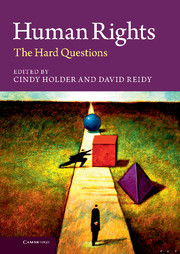Book contents
- Frontmatter
- Contents
- Figure
- List of table
- Notes on contributors
- Introduction
- Part I What are human rights?
- Part II How do human rights relate to group rights and culture?
- 4 The significance of cultural differences for human rights
- 5 Groups and human rights
- 6 Entangled
- 7 What does cultural difference require of human rights?
- Part III What do human rights require of the global economy?
- Part IV How do human rights relate to environmental policy?
- Part V Is there a human right to democracy?
- Part VI What are the limits of rights enforcement?
- Part VII Are human rights progressive?
- Index
- References
7 - What does cultural difference require of human rights?
Published online by Cambridge University Press: 05 May 2013
- Frontmatter
- Contents
- Figure
- List of table
- Notes on contributors
- Introduction
- Part I What are human rights?
- Part II How do human rights relate to group rights and culture?
- 4 The significance of cultural differences for human rights
- 5 Groups and human rights
- 6 Entangled
- 7 What does cultural difference require of human rights?
- Part III What do human rights require of the global economy?
- Part IV How do human rights relate to environmental policy?
- Part V Is there a human right to democracy?
- Part VI What are the limits of rights enforcement?
- Part VII Are human rights progressive?
- Index
- References
Summary
Introduction
The contemporary right to freedom of thought together with all its further declinations into freedom of speech, religion, conscience and expression had one of its earliest historical recognitions at the end of the Wars of Religion with the Edict of Nantes (1598). In several respects one can say that the right to freedom of thought is virtually “co-original” with the end of the Wars of Religion. Following this thought further, one might think that human rights define the boundaries of our social coexistence and are inextricably connected to the “fact” of cultural pluralism.
By pursuing a critical-genealogical approach, I will first investigate the historical context within which the concept of human rights originated and then proceed to clarify the normative political significance of the notion of cultural diversity and pluralism. Pluralism is essential to the structure of the problem of justice within modern democracies. For example, it leads John Rawls in Political Liberalism (1993) to argue for a conception of political stability constructed on the basis of an overlapping consensus among “reasonable comprehensive doctrines.” Drawing on this Rawlsian line of thought, I will attempt to clarify the notion of overlapping consensus, asking whether it can be taken as an empirical fact or as a fact of political reason and whether it is sufficient to political stability and what all this means for human rights and cultural pluralism.
- Type
- Chapter
- Information
- Human RightsThe Hard Questions, pp. 136 - 150Publisher: Cambridge University PressPrint publication year: 2013

